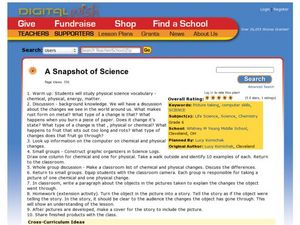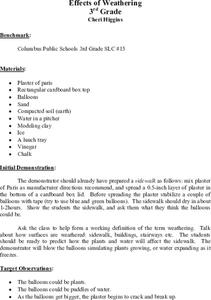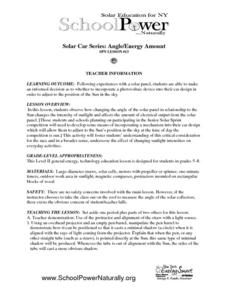Curated OER
Work and Power Worksheet #1
How much work is done when a force moves a block? How far will power lift a block? And how much work can be done by a motor? These are the kinds of questions you will find on this physics problem solving sheet. With 19 problems to solve,...
CK-12 Foundation
Coriolis Effect: Flying... South?
It turns out there's a lot more to heading south for the winter for migratory birds! Study the Coriolis Effect with a fun, hands-on teaching tool. Pupils take to the skies as a small red bird bound for the tropics from his frosty home at...
Virginia Department of Education
Weather Patterns and Seasonal Changes
Get your class outside to observe their surroundings with a lesson highlighting weather patterns and seasonal changes. First, learners take a weather walk to survey how the weather affects animals, people, plants, and trees during...
DiscoverE
Product Dissection
Sometimes, taking things apart is more fun than putting things together. Groups of learners participate in a reverse engineering activity. They dissect a device of their choosing to see how it works—great hands-on learning from the...
Curated OER
A Snapshot of Science
Sixth graders explore physical and chemical changes. In this physical science lesson, 6th graders study vocabulary, discuss the changes they see in the world and look up information on chemical and physical changes. Students create...
Curated OER
Parachute Drop
Learners will have fun creating a parachute to collect data with. They will construct the parachute in small groups, measure the materials, and create an observation sheet. Then they drop the parachute and make predictions about how long...
Curated OER
How Far Can You Jump?
Students estimate the distance of student's broad jumps. This activity can take place in the block center with a small group of students. They are explained that they are going to jump from a starting point (marked with the masking...
Curated OER
Flutter Farm
Students create their own butterfly garden and follow a participation plan to ensure that everyone will have a hand in the garden. In this gardening lesson plan, 5th graders log their progress with their garden by taking photos, and...
Exploratorium
Pixels, Pictures, and Phones
Take a real close look at your phone screen. What do you see? Here's an activity that provides guidance on how to look at a smart phone screen in order to see the pixels and to see how the phone creates colors and motion on the screen.
CK-12 Foundation
Sedimentary Rock Classification: How Old is That Layer?
A timely resource illustrates the effects of the passing years on sedimentary rock formation! Young geologists discover just how long it takes to create shale, slate, and other sedimentary rocks. The interactive also shows...
Polar Trec
Why Can’t I Eat This Fish?
Can turning on the television lead to toxins in the food supply? The lesson offers an opportunity for young scientists to complete guided research. A worksheet lists each question as well as the web page necessary to answer the question....
Cornell University
Physics of Flight
Up, up, and away! Take your classes on a physics adventure. Learners explore the concepts important for flight. They experiment with the Bernoulli Principle while learning the forces that act on airplanes in flight.
American Museum of Natural History
Make Your Own Weather Station
Scholars build a weather station equipped with a wind vane, rain gauge, and barometer. Following an informative page about the weather, learners follow steps to build their pieces then turn into meteorologists to chart the weather they...
Curated OER
Speedy Succession
Fifth graders identify how a pond can change into a grassland. An ecosystems lesson where learners identify pioneer and climax species, and recognize that ecological succession can take up to 100 years or more. Some excellent activities...
Curated OER
Effects of Weathering
Here's a great geology lesson for 3rd graders on weathering and erosion of soil. After a class discussion on how nature can "move a mountain," learners take a look at how a modern phenoma called acid rain can also cause weathering and...
Curated OER
Trash Talkin
Young scholars investigate recycling at several scales, including local, state, national and global. They become aware of recycling, re-use, reduce efforts and policies. Students read the article Where Does Your Garbage Go. They look up...
Curated OER
Living and Non-Living Things
Take a walk and observe living and non-living things on the way. Young scientists practice making valuable observations and draw the details. You could require that your students complete a T chart of living and non-living things and...
Polar Trec
What Is My Footprint?
How do one's habits and lifestyle choices affect the environment? Through a short online survey, learners will calculate their own carbon footprints then determine how to reduce their impact on the environment through simple steps, such...
Berkshire Museum
Backyard Rocks
You don't have to travel far to learn about rocks, just step outside, pick up a stone, and begin investigating. After taking a class walk around the school grounds collecting rocks, young scientists practice their skills of observation...
Cornell University
Radical Reactions
The radical reactions of polymers seems abstract to many pupils, but this lesson turns them into a fun building game. Scholars use dice and building pieces to build polymers. Then, they determine the theoretical and experimental weight...
Nuffield Foundation
How Much Energy Is There in Food?
People associate calories with food, but what is a calorie? Young scientists measure the number of calories in samples of food to better understand the concept. They test a variety of samples, take measurements, and compare their results...
Discovery Education
Through the Looking Glass
Turning white light into colors only takes a little scientific know how! Young scholars create their own spectroscope in a hands-on activity exploring the properties of light. Using a diffraction grating, they discover how white light...
Curated OER
Prairie Scavenger Hunt
Middle schoolers take a close look at the prairie environment. They identify common plants and animals of the prairie. In addition, pupils work in teams in order to put together a presentation on a certain aspect of the prairie...
Curated OER
Solar Car Series: Angle/Energy Amount
Does the angle of a solar panel change the output? Emerging engineers find out! Demonstrate for your class how they can angle a straw to match the angle of light rays coming from a source. Then turn them loose to experiment with the...
Other popular searches
- Turn Taking Activity
- Turn Taking Skills
- Pragmatics, Turn Taking
- Appropriate Turn Taking
- Pragmatics Turn Taking
- Play Turn Taking
- Life Skills Turn Taking
- Turn Taking in Conversation

























